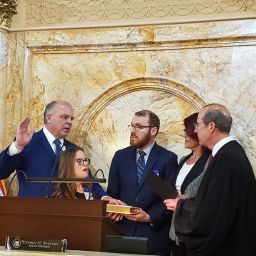Trenton – Legislation sponsored by Senator Linda Greenstein, Senator Nilsa Cruz-Perez and Senator M. Teresa Ruiz, which provides certain protections to incarcerated parents in correctional facilities who are primary caretakers of their children, was signed into law by Governor Phil Murphy today.
“We took a great step as a state today signing the ‘Dignity for Incarcerated Caretakers Act’ which implements needed criminal justice reform that places an emphasis on the rights of our caregivers that are incarcerated,” said Senator Greenstein (D-Mercer/Middlesex). “When families are fractured, it results in immense mental and emotional distress. Inmates do not deserve to be stripped of their dignity and especially not their right to maintain a relationship with their children. This law not only protects the rights of our caregivers but it strengthens our communities and addresses recidivism at its core.”
The law will require the Commissioner of Corrections and the chief executive officer of each county correctional facility to adopt policies concerning primary caretakers of children. An inmate who has a child will be placed in a facility as close to the child as possible at the request of the inmate and prior to sentencing.
The law will also establish a minimum standard for hours of visitation, prohibiting restrictions on the number of children allowed to visit and authorize the minimum number of adult visitors and contact visits.
“Serving time is crippling for those in prison, their children and their loved ones,” said Senator Ruiz (D-Essex). “While there is much work to be done to address mass incarceration at the national level, by offering better resources and services to those who are imprisoned and their families, we can mediate the effects it has had on the family structure in black and brown communities around New Jersey. This law will help families to avoid the crushing effects of incarceration, ensure inmates are receiving the care that they need and establish programs designed to reduce recidivism.”
The law will require the following:
• Prohibit solitary confinement and the shackling of pregnant inmates
• The availability of parenting classes
• Trauma-informed care for inmates and the training of corrections officers to interact with victims of trauma
• Mentoring by former inmates to assist with reentry
• Feminine hygiene products to be made available free-of-charge
• Prohibiting corrections officers from entering the restrooms or showers of the opposite sex unless deemed necessary by the commissioner
• The option for primary caretaker parents to enroll in residential drug abuse and mental health programs
The law will also clarify the responsibilities of the Office of the Corrections Ombudsperson. Currently, the office is responsible for establishing and implementing procedures to elicit, receive, process, respond and resolve complaints from inmates, their families, other interested citizens, public officials, and government agencies concerning conditions of confinement. The office will be required to provide information to inmates and their families, promote public awareness of the rights of inmates, identify systematic issues and responses and ensure compliance with relevant laws and policies.
The ombudsperson will be appointed by, and report to, the governor for a term of five-years unless a successor is appointed.











